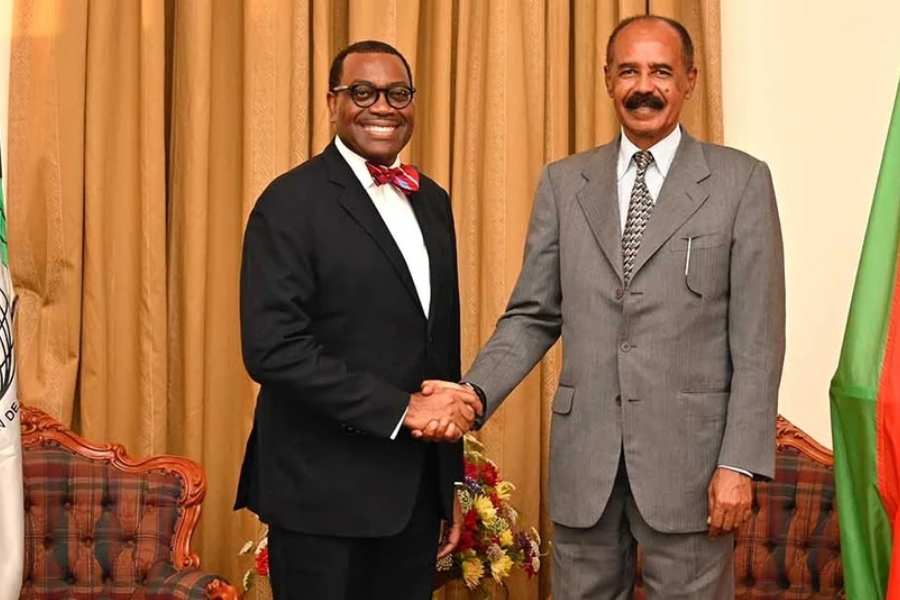
African Development Bank Group and Eritrea strengthen partnership for growth
The African Development Bank Group and Eritrea on Friday strengthened their partnership to support the country’s growth and place it on a more sustainable development path in the coming years.
Eritrean President Isaias Afwerki thanked African Development Bank President Akinwumi Adesina for the strategic role the Bank was playing in improving the lives of the Eritrean people. He said the country had identified the African Development Bank Group as the partner of choice to drive rapid socio-economic development and to move its economy “from subsistence to industrialisation.”
Afwerki was speaking in the Eritrean capital, Asmara, at a meeting with the African Development Bank chief. Adesina is the first African Development Bank president to visit Eritrea, which joined the institution in 1994.
Afwerki said Eritrea had found the African Development Bank Group to be an ally and a key partner for development.
“We have had fruitful engagements with the Bank and want to do more with the institution on a sustainable level,” he said. He also called for more resources for the African Development Bank and for it to be strengthened to support Africa’s development priorities.
Afwerki also called for additional support in other critical areas, including support for fishing communities, agriculture, skills and capacity development to increase self-sufficiency, and integrated infrastructure to enable the country to make the most of its large potash deposits.
In April, the African Development Bank’s board of directors approved a US$49.92 million financing grant for the construction of a 30-megawatt solar photovoltaic power plant in Dekemhare. This is the Bank’s largest investment in the country. The project will have a transformative impact on improving access to energy in Eritrea. It will contribute to the Eritrea’s target of generating 360 megawatts of electricity by 2030.
In 2018, Eritrea signed a peace and cooperation agreement with its neighbour, Ethiopia. This milestone marked the end of 20 years of conflict that had hampered economic development. The agreement and the lifting of United Nations and United States sanctions ended a decade of international isolation for Eritrea.
The African Development Bank Group has committed to support Eritrea’s development, including its goal of self-reliance.
Adesina said the African Development Bank as an important partner of Eritrea. The Bank is currently supporting the country in energy, water and sanitation, agriculture, skills and capacity development, as well as economic and financial governance.
Adesina said: “As President of the African Development Bank, I can assure you that under my leadership, the African Development Bank will be there to support Eritrea’s drive to transform its economy. It can only get better with all the projects we have talked about today. If we work together, I know that Eritrea will be a much better country in many ways.”
Adesina said the Eritrean leader had been consistent with his engagement with the African Development Bank since Eritrea joined the institution nearly 30 years ago.
He highlighted the need to prioritise agro-industrialisation to further grow the agriculture sector and ensure food stability. He also proposed the African Development Bank’s Special Agro-Industrial Processing Zones initiative as a model for transforming Eritrea’s rural communities into prosperous economic zones, harnessing the power of commercial agriculture and food production.
The Bank president said global shocks, including the impacts of Russia’s invasion of Ukraine, underscored the need for Africa to claim its place as the world’s food basket, considering the continent’s endowments of arable land, water, and other resources.
Adesina also emphasised the role of skills, capacity development and technology transfer, which he said should be embedded in development operations to ensure their sustainability. He said the African Development Bank and the Eritrean government must work together on this important agenda to maximise the developmental impact of the institution’s support.
The African Development Bank is already supporting skills development through its Support to Skills Development for Employability and Entrepreneurship Project. This project is increasing access to quality technical vocational education and training in the country. It has particularly benefitted Eritrean youth.
Adesina stressed the importance of public debt management for macroeconomic stability and access to diverse sources of development finance.
The African Development Bank’s Public Financial Management and Statistical Capacity Development Project has helped Eritrea successfully implement the Debt Management and Financial Analysis System and train Ministry of Finance staff. The Bank has also expressed its readiness to provide additional support in debt policy and management. This would include developing a medium-term debt strategy to ensure Eritrea’s debt sustainability.
Adesina commended the Eritrean government for the ongoing rollout of M-Nakfa. This is a mobile payment system like Kenya’s popular M-Pesa, which has revolutionised digital financial services in Kenya. M-Nakfa is expected to have similar transformative results in Eritrea.
Adesina said that a robust payment system and digital technology were important components of financial sector development reforms. He said: “An efficient financial sector supports domestic resource mobilisation and contributes to economic development.”
At an earlier meeting with Minister Finance and National Development Minister Dr Giorgis Teklemikael, Adesina remarked that the partnership between the African Development Bank and Eritrea was flourishing, as borne out by the cumulative portfolio size of US$126.1 million. This is a portfolio of 14 African Development Bank operations in the country as of the 4th of August 2023.
The African Development Bank hosts the African Legal Support Facility, which will offer Eritrea support as it develops its Environment Management Framework. This will include helping the government build the capacity of its institutions to effectively undertake environmental due diligence activities, particularly in the mining sector.
Accompanying the African Development Bank president were the institution’s vice president for power, energy, climate and green growth, Dr Kevin Kariuki; special advisor to the president for shareholder relations, Modibo Touré; country programme officer, Kenneth Onyango; and other sector specialists, including Lead Economist, Edward Sennoga; and Regional Energy Sector Manager, Alemayehu Wubeshet Zegeye.
Eritrea Presidential visit to strengthen partnership for growth: Interview with AfDB President Adesina
